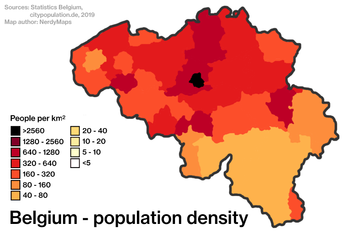
Back سكان بلجيكا Arabic Население на Белгия Bulgarian Obyvatelstvo Belgie Czech Demografía de Bélgica Spanish جمعیتشناسی بلژیک FA Démographie de la Belgique French Բելգիայի բնակչություն HY Demografi Belgia ID 벨기에의 인구 Korean Belgijos demografija LT
| Demographics of the Kingdom of Belgium | |
|---|---|
 Population pyramid of Belgium in 2022 | |
| Population | 11,763,650 (January 2024) 82nd |
| Growth rate | 0.54% (2021 est.) |
| Birth rate | 9.4 births/1,000 population (2023) |
| Death rate | 9.8 deaths/1,000 population (2021) |
| Life expectancy | 81.65 years (2021 est.) |
| • male | 79.2 years (2021)[1] |
| • female | 84 years (2021)[1] |
| Fertility rate | |
| Infant mortality rate | 3.24 (2021 est.) |
| Age structure | |
| 0–14 years | 16.1% (male 857,373/female 822,303) |
| 15–64 years | 66.3% (male 3,480,072/female 3,419,721) |
| 65 and over | 17.6% (male 760,390/female 1,074,477) (2009 est.) |
| Sex ratio | |
| At birth | 1.04 male(s)/female (2009 est.) |
| Under 15 | 1.04 male(s)/female |
| 15–64 years | 1.02 male(s)/female |
| 65 and over | 0.72 male(s)/female |
| Nationality | |
| Nationality | noun: Belgian(s) adjective: Belgian |
| Major ethnic | 58% Flemish |
| Minor ethnic | 31% Walloon, 11% Mixed/Other |
| Language | |
| Spoken | Dutch, French, German |

Demographic features of the population of Belgium include ethnicity, education level, health of the populace, economic status, religious affiliations and other aspects. All figures are from the National Institute for Statistics unless otherwise indicated.[3]
- ^ a b "Life expectancy". Healthy Belgium. 2022.
- ^ "Birth rate in Belgium at its lowest level in 81 years". VRT (broadcaster). 29 July 2024.
- ^ "Bevolking - Statistieken & Analyses - Home". Statbel.fgov.be. Archived from the original on 9 March 2011. Retrieved 24 August 2017.